新人教版必修1高中英语Unit3TraveljournalSectionⅣLearningabout
- 格式:ppt
- 大小:2.55 MB
- 文档页数:36

人教版•必01课前预习检测单词识记1.reliable (妙)可信赖的;可靠的- rely(加)依靠2.view仇.)风景;视野;观点;见解(九)观看;注视;考虑;;;;3.midnight 午夜;子夜x 4. flame®.)火焰;光芒;热情i5. beneath (prep.')在下面I 6. boil (况)(指液体)沸腾;冰)开~ boiling (如.)沸腾的boiled (adj)烧开的7. forecast (n. &况.)预测;预报forecast (过去式)f forecast (过去分词)& wool (〃.)羊毛;毛织品f woollen 羊毛(制)的;毛料的I I :9.insunmce 仇)保险10.Pilbw 仇)枕头;枕垫短语完形1 .instead of 相反;代替:2.give 叩1放弃;停止13.be sure of/about 确信4. be dressed in 穿着5.as usual 照常6.change...血...把 ........... 换成...7.put 11P 举起;建造;张贴;留宿& stay awake醒着9. at midnight 在午夜 1 1 '10. leave behind• • •忘了带;将•…“抛在后面11. take care当心;注意!12. say hello to sb. 和/向某人打招呼13. can't wait to do sth・迫不及待地做某事句型搜索l.A determined person always tries to finish the job, no matter how hard if is•(教材P20)[信息提取]no matter how引导让步状语从句□[例句仿写]不管他多么努力地尝试,他都不能让她改变她的主意。
No mat⑹ how hard he tried ,he couldn't get her to change her mind.2. Have you ever seen snowmen ride bicycles?(教材P22)[信息提取]“see+宾语+do(宾补)”结构[例句仿写]刚才我看到一辆红色的汽车经过。

人教版高一英语必修一Unit3 Travel journal知识解读重点单词、词组:1. journal n. 日记→journalist n. 记者2. fare n. 费用3. transport n. vt 运输→transportation n.运输工具4. finally adj. 最后→final adj.5. cycle vi. 骑自行车→recycle v. 使再循环6. persuade vt. 说服7. stubborn adj. 顽固的8. insist vt. 坚持9. proper adj. 适当的→properly adv.10. properly adv. 适当地11. determine vt.坚决;确定→determination n.12. determined adj. 坚决的13. altitude n. 海拔高度14. attitude n.态度15. camp n. vi.营地设营16. record vt. vi .n.记录录音纪录,唱片→recorder n.录音机17. topic n.话题主题18. familiar adj.熟悉的19. brave adj. 勇敢的→bravely adv. →bravery n. 勇气积累单词: remarkable [rɪ'mɑːkəb(ə)l]非凡的recurrent [rɪ'kʌr(ə)nt]n. 屡次重点短语:1. get sb interested in 使某人对……感兴趣2. the best way of doing sth /the best way to do sth 干…最好的方法3. care about 关心忧虑4. care for /to do sth 希望或同意做某事care for sb 喜欢某人5. give in 投降让步6. make camp 野营宿营7. dream of doing 梦想做某事8. persuade sb into/out of (doing) sth 说服某人做某事/不做某事9. try to persuade sb to do 尽力说服某人做某事= advise sb to do sth10. insist on sth /doing sth 一定要(某事);坚决主张11. make up one’s mind 下定决心12. put up one’s tents 搭起帐篷13. set /break(beat)/hold a record 创造/打破/保持记录14. have a dream of sb/sth/doing sth 梦见某人/某物/梦想……15. dream of/about …dream a dream16. be determined to do sth 决心干某事(表状态)17. determine sb to do sth 使某人下决心做某事(表动作)18. sb be familiar with sth 某人熟悉某物sth be familiar to sb 某物被某人所熟悉sb be familiar with sb 某人与某人亲密无间19. A be similar to B A与B相似20. read one’s mind 看出某人心事take one’s mind off sth 转移注意力keep one’s mind on sth 把注意力放在……keep/bear sth in mind 记住……She has many problems on her mind 她心事重重21. give in to sb 对某人让步give away赠送give off 放出(液体气体气味光热量)give out分发give in放弃Section A Warming Up,Pre-reading,Reading & Comprehending 重点单词1. journal n. 日记;杂志;定期刊物a medicine journal 医学杂志He kept a journal of his wanderings across Asia.他记载了一篇漫游亚洲的日记。
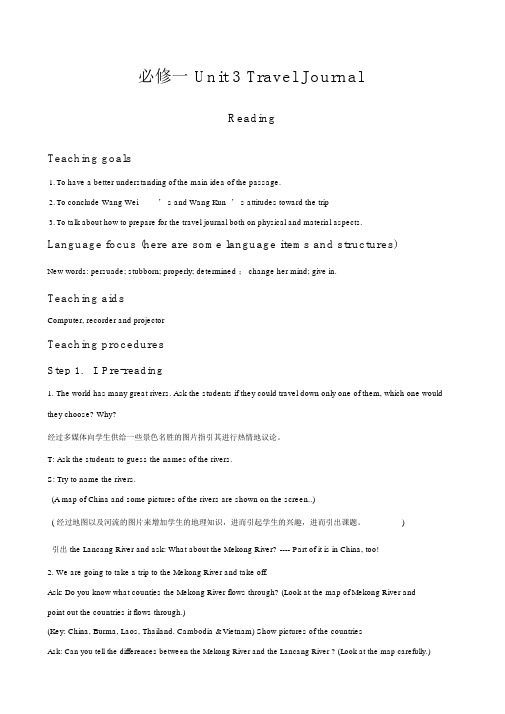
必修一 Unit 3 Travel JournalReadingTeaching goals1.To have a better understanding of the main idea of the passage.2.To conclude Wang Wei’ s and Wang Kun ’ s attitudes toward the trip3.To talk about how to prepare for the travel journal both on physical and material aspects.Language focus (here are some language items and structures)New words: persuade; stubborn; properly; determined ; change her mind; give in.Teaching aidsComputer, recorder and projectorTeaching proceduresStep 1. I. Pre-reading1.The world has many great rivers. Ask the students if they could travel down only one of them, which one would they choose? Why?经过多媒体向学生供给一些景色名胜的图片指引其进行热情地议论。
T:Ask the students to guess the names of the rivers.S:Try to name the rivers.(A map of China and some pictures of the rivers are shown on the screen..)( 经过地图以及河流的图片来增加学生的地理知识,进而引起学生的兴趣,进而引出课题。

必修一Unit 3 TraveljournalThe Third Period●从容说课This is the third period of this unit.To test if Ss have understood the phrases and patterns they learned during the second period,the teacher can first give them some revision exercises.“It is ...that”is a very difficult structure,so the teacher can design some exercises for Ss.Ss have got some idea about the present continuous tense for future use in the first period,to make them more familiar with its function,the teacher can give them more practice,both oral and written.Meanwhile,the teacher will help them go over another two ways of expressing future actions.These tasks are designed to improve their ability of using language.To make Ss well prepared for the reading of the fourth period,the teacher can deal with the rest few new words in this class.As to the homework,the teacher will ask Ss to preview Part 3 on Page 19 after class.Because this work is a bit difficult,tell Ss any group work is welcome.Since the five-day National holidays are coming.Suppose that one student and his friends will go for a trip.Ask them to go to a nearby travel agency and find a schedule for their ter they are required to talk about what they will do on their travel,using present continuous tense.Through this activity,Ss can get to know what a travel plan is like,and consolidate what they have learned,which is correspondent to the teaching method “Learn through doing”.●三维目标1.Knowledge:(1)Learn the present continuous tense for future use.(2)Go over the other two ways of expressing future actions.2.Ability:Learn to make sentences,using the above three ways.3.Emotion:Develop Ss’ sense of group cooperation.●教学重点The present continuous tense for future use.●教学难点(1)It is ...that...(2)The present continuous tense for future use.●教具准备Multi-media classroom and other normal teaching tools.●教学过程Step 1 GreetingStep 2 RevisionT:First I will test how well you understand what you learned yesterday.Please judge whether the following sentences are right.If they are not right,please correct them.(1)It is with the help of the teacher that I passed the exam.(2)It is I who is wrong.(3)It was she that he helped with her homework yesterday.(4)It was at the post-office where we met each other.(5)It was yesterday afternoon when they played a close basketball game.(6)Who was it that discovered the secret?S:I think it’s right.T:Do you agree with him?S2:No,I think it is not right.But I don’t know why.T:Does any one know the reason?S3:In that cause,the past tense is used,so I think we should change “is”to “was”.T:Quite Good.That is to say:当原句的时态为表示现在的各种时态时,用It is...;当原句的时态为表示过去的各种时态时,则用It was...。

高中英语学习材料(灿若寒星*制作整理)必修1 Unit3 Travel journalI.单元基础知识一、核心单词1.________ n.态度;看法2.________ n..弯;拐角v.(使)弯曲;弯腰3.________ n.时间表;进度表vt.为某事安排时间4.________ n.风景;视野;观点;见解vt.观看;注视;考虑5.________ n.旅行;旅程6. _________ n.缺点7.________ vi.骑自行车8.vi.毕业n.大学毕业生9.n.细节;详情10.adj.最后的;最终的11._______ adj.顽固的;固执的12.n.缺点;不利条件13.________ vt.确保;给……保险vi.投保(后接against)14.n.火焰;光芒;热情15.________ vi.依靠;依赖16.________ vt.说服;劝说17.________ n.运送;运输vt.运输;运送18.________ vt.决定;确定;下定决心19.________ vt.组织;成立20.________ vt.更喜欢;选择某事物(而不选择其他事物) 二、高频短语1.从那以后________2.喜爱;喜欢 ________3.关心;忧虑;惦念________4.改变主意________5.下决心;决定________6.投降;屈服;让步________7.照常;像往常一样________8.在午夜________9.比起某物更喜欢某物________10.弯腰________11.梦想做某事________12.说服/劝服某人做某事________13.把某物换成某物________14.做伴;一起________15.从……毕业________16.(曾)一度;在某一时刻 ________17.这时候;此时此刻 ________18.支起;搭起;张贴 ________19.迫不及待地要做某事________20.天气预报________三、重点句型(填空)1. It was my sister ________ first had the idea to cycle along the entire MekongRiver from ________ it begins to where it ends.是我姐姐先想到要沿着湄公河骑自行车,从它的源头一直骑到入海口。
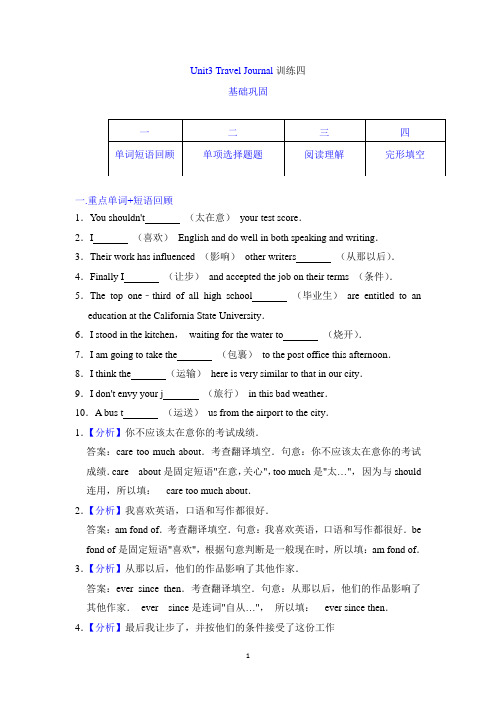
Unit3 Travel Journal训练四基础巩固一.重点单词+短语回顾1.You shouldn't(太在意)your test score.2.I(喜欢)English and do well in both speaking and writing.3.Their work has influenced (影响)other writers(从那以后).4.Finally I(让步)and accepted the job on their terms (条件).5.The top one﹣third of all high school(毕业生)are entitled to an education at the California State University.6.I stood in the kitchen,waiting for the water to(烧开).7.I am going to take the(包裹)to the post office this afternoon.8.I think the(运输)here is very similar to that in our city.9.I don't envy your j(旅行)in this bad weather.10.A bus t(运送)us from the airport to the city.1.【分析】你不应该太在意你的考试成绩.答案:care too much about.考查翻译填空.句意:你不应该太在意你的考试成绩.care about是固定短语"在意,关心",too much是"太…",因为与should 连用,所以填:care too much about.2.【分析】我喜欢英语,口语和写作都很好.答案:am fond of.考查翻译填空.句意:我喜欢英语,口语和写作都很好.be fond of是固定短语"喜欢",根据句意判断是一般现在时,所以填:am fond of.3.【分析】从那以后,他们的作品影响了其他作家.答案:ever since then.考查翻译填空.句意:从那以后,他们的作品影响了其他作家.ever since是连词"自从…",所以填:ever since then.4.【分析】最后我让步了,并按他们的条件接受了这份工作答案:gave in.考查翻译填空.句意:最后我让步了,并按他们的条件接受了这份工作.give in是固定短语"屈服,让步",根据accepted可以判断本句是过去时,所以填:gave in.5.【分析】所有高中毕业生中排名前三分之一的人有权在加州州立大学接受教育.答案:graduates.本题考查翻译填空.根据句意和所给汉语提示可知这里使用名词"毕业生"graduate,和all搭配用复数.6.【分析】我站在厨房里,等水烧开.答案:boil.本题考查翻译填空.根据句意和所给汉语提示可知这里使用wait for sb to do sth等待某人做某事.7.【分析】今天下午我要把包裹送到邮局.答案:parcel.本题考查翻译填空.根据句意和所给汉语提示可知这里使用名词parcel意为"包裹",这里是单数.8.【分析】我认为这里的交通和我们城市的交通很相似.答案:transport.本题考查翻译填空.根据句意和所给汉语提示可知这里使用名词transport"运输",这是不可数名词.9.【分析】我并不羡慕你在这样恶劣的天气里旅行.答案:journey.考查翻译填空.根据句意及句子结构,要填入journey,envy 是及物动词,后接名词作宾语.journey是可数名词,根据语境要用单数形式.10.【分析】一辆公交车将我们从机场送到了市区.答案:transported.分析句子的结构可知,本空需要一个动词用作句子的谓语,结合汉语提示可知使用动词transport,该句陈述的是过去的事实,所以使用一般过去时,故答案为transported.二.单选题(针对重点语法+单词+短语练习)1.It took many years for him to ____ in New York and live peacefully.A.pack B.settle C.hide D.recover2.If you don't work hard now,you'll be ____in the future.A.failing B.succeeding C.suffering D.losing3.We will set out soon.You need to ____ your things as soon as possible.A.pack up B.put up C.set up D.go up4.﹣Have you ____ some new ideas?﹣Yeah.I'll tell you later.A.come about B.come intoC.come up with D.come out with5.In Britain today women ____ 44% of the workforce and nearly half mothers are at work.A.build up B.take up C.make up D.set up 6.Mr.Black has been teaching English in a middle school _____ he came to China.A.for ever B.ever sinceC.ever before D.long before7.Readers can _____quite well without knowing the exact meaning of each word.A.get over B.get inC.get along D.get through8.The activities organized by our school really gave us a platform ________ we learned team spirit.A.that B.where C.which D.when9.At the end of the meeting,it was announced that an agreement .A.has been reached B.had been reachedC.has reached D.had reached10.The waste water has been made clean before it goes into the river ______ the new rule was made.A.when B.ever since C.after D.before1.【分析】他花了很多年在纽约定居下来过上平静的生活.答案:B解析:A:打包;B:定居;C:隐藏;D:恢复;康复.根据句意"他花了很多年在纽约定居下来过上平静的生活."及所给选项分析可知,本题答案为B 选项;其余选项均不符合题意.故选:B.2.【分析】现在你不好好学习,以后就要受苦了.答案:C解析:A:失败;B:成功;C:受苦;D:失败.根据句意"现在你不好好学习,以后就要受苦了."及所给选项分析可知,本题答案为C选项;其余选项均不符合题意.故选:C.3.【分析】我们很快就要出发了,你需要尽快把你的东西打包好.答案:A解析:A:打包;B:张贴;搭建;为某人提供住宿;C:建立;设立;D:上升.根据句意"我们很快就要出发了,你需要尽快把你的东西打包好."及所给选项分析可知,本题答案为A选项;其余选项均不符合题意.故选:A.4.【分析】﹣﹣你提出了一些新观点吗?﹣﹣是的.我过一会儿告诉你.答案:Ccome about 发生,产生;come into 进入,得到;come up with 提出;come out with 说出,发表,公布.根据语境可知此处所要表达的意思是"你提出了一些新观点吗",因此答案选C.故选:C.5.【分析】今天在英国妇女组成了44%的劳动力,几乎一半的妈妈在工作.答案选C.build up 增强,加强;take up 占据(时间/空间等);开始从事;接受;make up 组成;弥补;化妆;编造,虚构;set up 设立,建立.根据句意及语境可知此处所要表达的意思是"组成了44%的劳动力…"6.【分析】自布莱克先生来到中国他就一直在一所中学教英语.答案:BA:永远;B:自从;C:之前;D:在…很久以前.根据句意"自布莱克先生来到中国他就一直在一所中学教英语."及所给选项分析可知,本题答案为B选项(A、C、D选项后面都不能接句子).7.【分析】在不明白每个单词的确切意思时,读者也能进展顺利.答案:C考查动词短语的辨析,get over"克服",get in"到达,插话",get along"进展",get through"通过",根据语境get along和quite well搭配,表示"进展顺利"故选:C.8.【分析】我们学校组织的活动给我们搭建一个平台,从中我们学到了团队精神.根据句子结构可知,________ we learned team spirit是一个定语从句,在该句子里主语宾语不缺,所以需用关系副词来引导,结合先行词为platform,表示一个抽象地点,所以用where.故选:B.9.【分析】在会议快要结束的时候,宣布了一项已经达成的协议.答案:B.这是一个复合宾语从句,主句的谓语动词用了一般过去时,所以从句中的谓语动词要用表示过去的某种时态.该句中要用过去完成时.agreement作reach 的逻辑宾语,所以要用被动语态.故选B.10.【分析】自从新规定出台以来,废水在流入河流之前就已经被净化了.答案:B.考查时间状语从句.根据句意:自从新规定出台以来,废水在流入河流之前就已经被净化了.when "当..时候";ever since"自..以来";after"..以后";before"..以后".根据句意,应该是:自..以来..故选:B.三.阅读理解I was blind,but I was ashamed of it if it was known.I refused to use a white stick andhated asking for help.After all,I was a teenage girl,and I couldn't bear people to look at me and think I was not like them.I must have been a terrible danger on the roads.Coming across me wandering through the traffic,motorists probably would have to step rapidly on their brakes.Apart from that,there were all sorts of disasters that used to occur on the way to and from work.One evening,I got off the bus about halfway home where I had to change buses,and as usual I ran into something."I'm awfully sorry,"I said and stepped forward only to run into it again.When it happened a third time,I realized I had been apologizing to a lamppost.This was just one of the stupid things that constantly happened to me.So I carried on and found the bus stop,which was a request stop,where the bus wouldn't stop unless passengers wanted to get on or off.No one else was there and I had to try to guess if the bus had arrived.Generally in this situation,because I hated showing I was blind by asking for help,I tried to guess at the sound.Sometimes I would stop a big lorry and stand there feeling stupid as it drew away.In the end,I usually managed to swallow my pride and ask someone at the stop for help.But on this particular evening no one joined me at the stop;it seemed that everyone had suddenly decided not to travel by bus.Of course I heard plenty of buses pass,or I thought I did.But because I had given up stopping them for fear of making a fool of myself,I let them all go by.I stood there alone for half an hour without stopping one.Then I gave up.I decided to walk on to the next stop.1.The girl refused to ask for help because she thought.A.she might be recognizedB.asking for help looked sillyC.she was normal and independentD.being found blind was embarrassing2.After the girl got off the bus that evening,she.A.began to runB.hit a person as usualC.hit a lamppost by accidentD.was caught by something3.At the request stop that evening,the girl.A.stopped a big lorryB.stopped the wrong busC.made no attempt to stop the busD.was not noticed by other people4.What was the problem with guessing at the sound to stop a bus?A.Other vehicles also stopped there.B.It was unreliable for making judgments.C.More lorries than buses responded to the girl.D.It took too much time for the girl to catch the bus.5.Finally the girl decided to walk to the next stop,hoping.A.to find people thereB.to find more buses thereC.to find the bus by herself thereD.to find people more helpful there.【大意】文章大意:本文主要介绍了一个盲人姑娘因为不愿意承认自己看不见而遇见的尴尬情景,最终因为等不到车而想放下自己的骄傲,想请人帮忙,可是那天该站就没有其他人等车,不得已,她向下一个车站走去,希望那里有人可以帮助她.【解析】1.D.本题考查推理题.根据第二段2,3行After all,I was a teenager girl,and I couldn't bear people to look at me and think I was not like them.说明她感觉到作为一个年轻的女孩,承认自己看不见是很尴尬的事情,故D正确.2.C.本题考查细节题.根据第三段第三行When it happened a third time,I realized I had been apologizing to a lamppost.说明她撞上了电线杆,故C正确.3.C.本题考查细节题.根据文章最后一段的句子:But because I had given up stopping them for fear of making a fool of myself,I let them all go by.说明女孩没有去拦下公共汽车,故B正确.4.B.本题考查推理题.根据第二段最后一句I had to try to guess if the bus had arrived.第三段第二行.Sometimes I would stop a big lorry and stand there feeling stupid as it drew away.说明有时候的判断是不值得信赖的.故B正确.5.A.本题考查推理题.从I had given up stopping them for fear of making a foolof myself可知,她本来不想拦车了,又由managed to swallow my pride and ask someone at the stop for help可知,她是决定放下骄傲,找人帮忙了,而在本站没有人,去下一站当然就是希望在那里可以找到人帮忙.所以本题选择A.【总结】考察学生的细节理解和推理判断能力,做细节理解题时一定要找到文章中的原句,和题干进行比较,再做出正确的选择.在做推理判断题不要以个人的主观想象代替文章的事实,要根据文章事实进行合乎逻辑的推理判断.四.完形填空I was an unlucky nurse who had to work on Christmas Day. It was always 1 in the emergency room on this day; so I was not expecting any patients. When I was complaining about 2 on such a beautiful festival, five people showed up at my desk—a pale woman and four small children."Are you all sick?" I asked in a(an) 3 way because they seemed all right."Yes," the women answered 4 and lowered her head.But when they started to present their problems, things got a little vague. Two of the children had headaches, 5 the headaches weren't accompanied by the normal body language such as holding the head. Two children had earaches, but neither of them could tell me 6 ear in pain. The mother complained of a cough but seemed to be 7 .Something was wrong, but I didn't say anything but explained that it might take a while 8 a doctor could meet them. “Take your 9 , please.” the mother responded. Then, I checked their charts ----no address. Suddenly I knew they were homeless and the hospital was 10 .I looked out at the family, gathering together under by the Christmas tree, smiling and 11 with each other sweetly. Quietly, I went back to nurses' station and told them that we had a homeless 12 in the waiting room. It was just like God sending us a 13 on Christmas Day. The nurses'station suddenly came back to 14 . All the nurses went into action, just as we did when there was a real 15 emergency. But this one was a “Christmas emergency”.We 16 our meals for our Christmas “patients”. We also put together oranges and apples 17 presents. Usually we just tried to 18 the physical needs of our patients. But today, we worked hard to exceed(超越) the needs of a family who only 19 a warm place on Christmas Day.Later, when the family was leaving, the four-year-old came back, gave me a 20 , "Thanks for being our angels today." she whispered in my ear.1. A. noisy B. quiet C. bright D. dark2. A. studying B. talking C. playing D. working3. A. expecting B. unbelieving C. forgetting D. accepting4. A. excitedly B. surprisingly C. strongly D. weakly5. A. or B. so C. but D. and6. A. which B. what C. how D. why7. A. explaining B. understanding C. pretending D. promoting8. A. before B. unless C. after D. when9. A. money B. breath C. time D. break10. A. cold B. warm C. big D. small11. A. quarreling B. fighting C. competing D. chatting12. A. family B. mother C. girl D. boy13. A. job B. luck C. gift D. help14. A. space B. earth C. school D. life15. A. medical B. physical C. political D. history16. A. made out B. took out C. turned out D. put out17. A. as B. for C. on D. in18. A. cut B. meet C. increase D. miss19. A. built B. escaped C. refused D. wanted20. A. cake B. bag C. visit D. kiss【答案】(1)B;(2)D;(3)B;(4)D;(5)C;(6)A;(7)C;(8)A;(9)C;(10)B;(11)D;(12)A;(13)C;(14)D;(15)A;(16)B;(17)A;(18)B;(19)D;(20)D;【解析】本文是一篇记叙文,作者在圣诞节这天接待了特别的“病人”——无家可归的一家人。

新课标人教版 Unit 3 Travel journal 游记核心词汇1.After the flood,many things have been ____________(运送)to the flooded area. 2.I think you don’t know your own ____________(缺点).In fact,no one is perfect. 3.He is so ____________(顽固的)that nobody can change his mind.4.We shouldn’t have a wrong ____________(态度)towards the students who are poor at their studies.5.My grandfather is unhealthy all the time,but he isn’t interested in life ____________(保险).6.The new bridge has been finished two years ahead of ____________(日程).7.We are looking for someone who is ____________(可靠的)and hardworking. 8.We tried to p____________ him to give up smoking,but he just wouldn’t listen. 9.He is a ____________ young man.Once he has made up his mind,nothing can change it.He is famous for his ______________.(determine)10.Children should learn to behave ____________ because ____________ words and behaviours will help them to reach their ambitions.In other words,if a person always behaves ____________,he will find it hard to realize his dream.(proper)1.transported2.shortcomings3.stubborn4.attitude5.insurance6.schedule7.reliable8.persuade9.determined;determination10.properly;proper;improperly高频短语1.________________ 从那以后2.________________ 喜爱;喜欢3.__________________ 关心;忧虑;惦念4.________________ 改变主意5.________________ 下决心;决定6.________________ 投降;屈服;让步7.________________ 照常8.________________ 在午夜9.________________ 在某处或某一时刻10.________________ 张贴;搭建1.ever since2.be fond of3.care about4.change one’s mind5.make up one’s mind6.give in7.as usual,8.at midnight9.at one point 10.put up重点句式1.___________ middle school,my sister Wang Wei and I have____________ taking a great bike trip.从高中起,我姐姐王薇和我就一直梦想作一次了不起的自行车旅行。

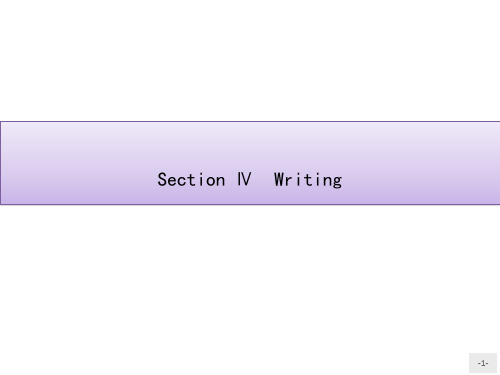


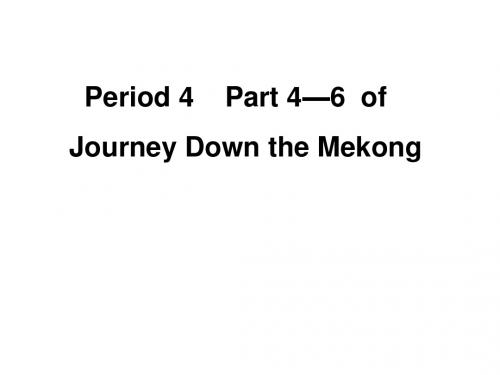

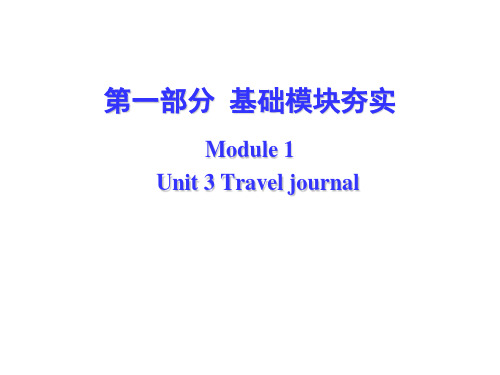
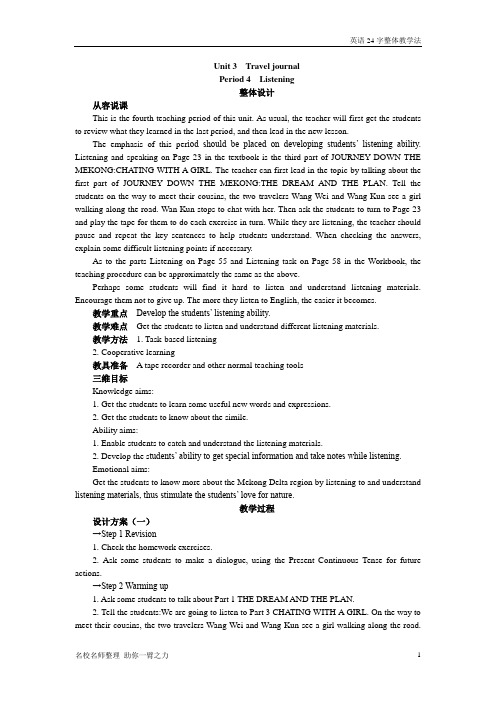
Unit 3Travel journalPeriod 4Listening整体设计从容说课This is the fourth teaching period of this unit. As usual, the teacher will first get the students to review what they learned in the last period, and then lead in the new lesson.The emphasis of this per iod should be placed on developing students’ listening ability. Listening and speaking on Page 23 in the textbook is the third part of JOURNEY DOWN THE MEKONG:CHATING WITH A GIRL. The teacher can first lead in the topic by talking about the first part of JOURNEY DOWN THE MEKONG:THE DREAM AND THE PLAN. Tell the students on the way to meet their cousins, the two travelers Wang Wei and Wang Kun see a girl walking along the road. Wan Kun stops to chat with her. Then ask the students to turn to Page 23 and play the tape for them to do each exercise in turn. While they are listening, the teacher should pause and repeat the key sentences to help students understand. When checking the answers, explain some difficult listening points if necessary.As to the parts Listening on Page 55 and Listening task on Page 58 in the Workbook, the teaching procedure can be approximately the same as the above.Perhaps some students will find it hard to listen and understand listening materials. Encourage them not to give up. The more they listen to English, the easier it becomes.教学重点Develop the students’ listening ability.教学难点Get the students to listen and understand different listening materials.教学方法 1. Task-based listening2. Cooperative learning教具准备 A tape recorder and other normal teaching tools三维目标Knowledge aims:1. Get the students to learn some useful new words and expressions.2. Get the students to know about the simile.Ability aims:1. Enable students to catch and understand the listening materials.2. Develop the s tudents’ ability to get special information and take notes while listening.Emotional aims:Get the students to know more about the Mekong Delta region by listening to and understand listening materials, thus stimulate the students’ love for nature.教学过程设计方案(一)→Step 1 Revision1. Check the homework exercises.2. Ask some students to make a dialogue, using the Present Continuous Tense for future actions.→Step 2 Warming up1. Ask some students to talk about Part 1 THE DREAM AND THE PLAN.2. Tell the students:We are going to listen to Part 3 CHA TING WITH A GIRL. On the way to meet their cousins, the two travelers Wang Wei and Wang Kun see a girl walking along the road.Wan Kun stops to speak to her.→Step 3 ListeningTurn to Page 23 and do each exercise in turn. Before listening, read aloud the tasks and make sure the students understand what to do. Try to guess what the listening is about.1. Play the tape, then let the students do Exercise 2:Listen to Part 3 CHATING WITH A GIRL and tick the statement which tells main idea of the dialogue.Check the answer with the whole class.2. Play the tape again for the students to answer the following questions:Where is the girl from?What do people in Laos use the river for?Why do people in Laos call the river “the sea of Laos”?What is the river called in Tibet and Vietnam?What other beautiful sights along the Mekong River in Laos?3. Play the tape for the third time for students to finish the passage in Exercise 3.Several minutes later, check the answers with the whole class. Play the tape again if necessary.4. Get into pairs and continue the dialogue between Wang Kun and the girl, using the expressions for good wishes and farewells.→Step 4 Listening (on Page 55 in the Workbook)Tell the students:Turn to Page 55. We are going to listen to Part 4 OCTOBER IN LAOS. Go through the tasks first and make sure you understand what to do.1. Play the tape for the students to do Exercise 2:Listen to Part 4 of JOURNAL DOWN THE MEKONG and tick the words you hear on the tape.2. Play the tape again for the students to do Exercise 3:Listen to this material again and answer the questions.3. In groups make a list of adjectives to describe the countryside in Laos.4. Check the answers with the whole class. Play the tape again if necessary.→Step 5 Listening task (on Page 58 in the Workbook)Tell the students:We are going to listen to Part 5 ON THE ROAD IN LAOS. In this part, Wang Kun is describing a few of the things they saw during their tour.1. Before listening, look at the picture and discuss the questions.1)Is this photo a modern one or was it take many years ago? How do you know?2)What information can you get from the picture?2. Play the tape for the students to write the main idea in one sentence.3. Play the tape again for the students to fill in the information on the chart.Life along the river in the past Life along the river now12 3 1 2 34. Discuss the questions.1)How did Wang Kun and Wang Wei greet the old man?2)What did they talk about?3)Do people like t he change of lifestyle? What about the old man’s attitude?4)Why does the man prefer the old day of life?Several minutes later, check the answers with the whole class. Play the tape again if necessary.→Step 6 Homework1. Finish off the Workbook exercises.2. Try to retell Part 3 CHA TING WITH A GIRL, Part 4 OCTOBER IN LAOS and Part 5 ON THE ROAD IN LAOS.板书设计Unit 3Travel journeyListeningPart 3 CHATING WITH A GIRL On the way to meet their cousins, the two travelerssee a girl walking along the road. Wan Kun stopsto chat with her. . .Part 4 OCTOBER IN LAOS . . .Part 5 ON THE ROAD IN LAOS . . .活动与探究Go to the library to read or get online to search in order to find some places of interest in China and in the world. Take notes of your findings and tell the class which place you want to visit most.Sample notes:Of all the notable mountains in China, Mount Huangshan, to be found in the south of Anhui Province, is probably the most famous. Originally known as Mt. Yishan it was renamed Mt. Huangshan in 747 AD in recognition of the legendary Huang Di, who was the reputed ancestor of the Chinese people and who made magic pills for immortality here.Wu yue is the collective name given to China’s most important mountains, namely Mt. Taishan in Shandong Province, Mt. Huashan in Shaanxi Province, Mt. Hengshan in Shanxi Province, Mt. Songshan in Henan Province and Mt. Hengshan in Hunan Province. It is said that you won’t want to visit any other mountains after seeing wu yue but you won’t wish to see even wu yue after returning from Mt. Huangshan. This saying may give you some idea of the beauty and uniqueness of Mt. Huangshan. Together with the Yellow River, the Yangtze River and the Great Wall, Mt. Huangshan has become one of the great symbols of China.Mt. Huangshan can boast not only of its magnificence but also its abundant resources and great variety of zoological species, for which it has been listed as a World Natural and Cultural Heritage Site.。


The Fourth Period●从容说课This is the fourth period of this unit.The teacher will first check the homework exercises.Since the present continuous tense for future use is not very difficult for the students,the teacher just offers the students the answers to the exercises in Part 1 on Page 57 and leaves Part 2 on Page 58 out.To get Ss a complete idea about the trip along the Mekong,the teacher will first check the homework exercise on Page 19.To show Ss Wang Kung’s and Wang Wei’s similar and different attitudes about the trip clearly,the teacher can designed a chart.This task is designed to develop Ss’ ability of reading between the lines as well as that of summarizing the text.After talking about the attitudes,the teacher can lead in Part 2 of this unit naturally by asking two questions:1.How does Wang Kung feel about the trip now?2.What do you think has changed his attitude?Then the teacher asks Ss to go through the passage quickly and find out the answers.Before the second reading,the teacher first can ask Ss how a travel journal is organized:(What can they write about when writing a travel journal?then write down their answers on the blackboard:see,hear,eat,wear,feel,do),finally ask them to list these things.These activities not only reminds Ss to read a passage as a whole,but also get them into the habit of reading a passage between the lines.Only in this way can they understand the writer’s implied meaning as well as enjoying the pleasure of reading.To make the students aware of the safety of a trip and to make sure that it is a safe and pleasant tri p,the teacher asks them to hold a discussion about what to do before starting a trip and then ask two of them to work together and write a short dialogue after class.The first task tells Ss to value their lives while the second task gives them a chance to practise writing.●三维目标1.Knowledge:(1)Learn to read between the lines and know Wang Kung’s and Wang Wei’s different and similar attitudes toward the trip along the Mekong.(2)Understand the second part of Journey Down the Mekong.2.Ability:(1)Learn how to read and organize a travel journal.(2)Get to know what to do before a trip.3.Emotion:(1)Develop Ss’ sense of group cooperation.(2)Get Ss to know the value of life and the importance to protect nature.●教学重点(1)How to read and organize a travel journal.(2)What to do before a trip.●教学难点(1)How to get the implied meanings of an passage.(2)How to read and organize a travel journal.●教具准备Multi-media classroom and other normal teaching tools.●教学过程Step 1 GreetingStep 2 RevisionT:First,I’ll ask some of you to give the answers to the exercises in Part 1 on Page 57.Suggested answers:are going/will go/am going to stay/will stay/am stayingis going to fly/will fly/is flyingis going to take/will take/is taking;leavesis giving;is sayingam comingare;going;are;gettingbought;will buy/are going to buy;met;will meet/are meeting/are going to meetStep 3 Lead inT:Here is good news.Your favorite singer Jay will give performances in Wuxi Stadium.But tomorrow you will take an English exam.What will you do?S1:Forget the exam and enjoy the concert first.S2:Forget the concert.Get well prepared for the exam.I can enjoy another concert of his some day.S3:...S4:...T:So we can see different students have different ideas,or different students hold different attitudes.(Write “hold a...attitude”on the blackboard).Do you know what an attitude is?S:An attitude is what a person thinks about something.T:Yes,usually different people hold different attitudes.Let’s turn back to Part O ne of this unit and make a comparison between Wang Kung’s and Wang Wei’s attitudes toward the trip along the Mekong.Present the chart on the screen;then give Ss a few minutes to discuss.similarity difference1. Wang Kung’s attitude Wang Wei’s attitude2.3.Suggested answer:similarity differencedream about it for a long time Wang Kung’s attitude Wang Wei’s attitudewant to begin it from the source of the Mekong It will be difficult because of thin airand cold weather.It will be an interesting experience.will not give it up however hard it isThey should know the details beforestarting.She doesn’t care much about details.T:Now,who do you think was right about the trip?S:Wang Kung.T:Why?S:His attitude was more practical and it is always right to get well prepared before setting out for a trip.T:Quite right.Step 4 First readingT:Now I’d like you to read the second part of this unit,and find out the answers to the two questions:1.How does Wang Kung feel about the trip now?2.What do you think has changed his attitude?Ss read the passage silently with some light music being played.T:Are you ready now?S:He thinks the trip is full of fun and excitement and he is eager for it.T:How can you know?S:The text says:to climb the mountain was hard work,but to go down the hills was great fun.It also says:we can hardly wait to see them.The later sentence means that Wang Kung and his sister were eager to meet their cousins and set out for the trip.T:Good answer and good explanation.You see,he can read between the lines.Class,you should learn from him.Who will be a volunteer to answer t he second question?S:I’ll try.At first,Wang Kung was not very eager for the trip,because he thought the trip would not be very easy because of thin air and cold weather.But the different experiences on the way to the altitude have changed his attitude.T:Can you tell us what the different experiences are?S:The changeable weather,the ice in autumn,their living in the tent,and the unusual quietness at night.T:Good,you read the text very carefully.Step 5 Second-readingT:Suppose you have just come back from a trip,and you want to tell your e-pal about your trip,what will you tell him?S:Of course I’ll tell him what I have seen during the trip,wonderful sceneries,interesting people and customs.S:I will tell him what I eat;in some places there are special delicious food.S:I can also tell him what I hear and what I do.S:At the end of my e-mail,I’ll tell him what I feel about the trip.T:So you know what to write about when writing a travel journal.And when reading such kind of articles,you also need to pay attention to these information.Please read the passage and fill in the chart.seeheardofeel(Chart one)Suggested answers:seesnowfall clear sky bright starshear almost no sound but that of the firedoride bicycle in the snowchange autumn clothes to winter clothes change winter clothes back to autumn clothes put up tents to make campfeel(legs)heavy and coldTo climb the mountain was hard work,but to go down the hills was great fun.can hardly wait to see their cousins(Chart two)Step 6 DiscussionT:We all know traveling is interesting and exciting,but sometimes dangerous.Now my question is:What can we do before we set out for a trip to make our trip a safe and pleasant one?Give Ss a few minutes to discuss.S1:I think we should first decide a proper destination.Think about our time and money,then find an ideal destination.S2:We should get to know the background information about the place we’ll visit,such as its language,history,culture,customs,religion,politics.S3:Decide what means of transport we wil l take to save money and time.S4:We’d better know about the weather ther e,so we can prepare proper clothes.T:Yes,proper clothes can keep you warm or cool.S5:I think a compass and a local map is always necessary in case that we lose our way.T:Good.And what else will take along with you?S6:Medicine.Someone may catch cold or get sunburn,or get bitten by mosquitoes.We can take some water-resistance sunscreen and insect repellent to avoid being bitten.S7:Maybe we can wear sunglasses or straw hats to protect ourselves from the sunshine.S8:We’d better take some food and drinks.S9:Take a cell phone with us.In case of emergency,we can get in touch with the police or relatives,thus we’ll get immediate rescue.S10:Fire-starter and matches are also ve ry useful.Fires are a great way to signal for help if you get lost.S11:I think that we can take an army knife or m ulti-purpose tool.They can not only be used to cut cheese or open cans,but also enable us to cut strips of cloth into bandages,remove splinters,fix broken eyeglasses,and perform a whole host of repairs on malfunctioning gear.S12:We can take a flashlight for fear of darkness in the wild.For Part 2 on Page 57,the teacher can ask individual student to come to the blackboard and write one sentence each.Then ask several other Ss to correct the mistakes,if there are any,and ask them to give reasons.Through these activities,Ss are given not only translation exercises,but also proofreading exercises,in which the mistakes are the typical ones made by Ss themselves.By checking the two exercises,the teacher can find out what Ss are still not quite familiar with and needs to be improved and make some necessary change of his/her teaching plans.T:(Present these information on the blackboard to make Ss remember them.The teacher can present the information in the form below:)T:I’d like to remind you that whenever you go,don’t forget to get your life insured.Step 7 Homework1.Imagine that the dialogue happens the next morning before Wang Kung and Wang Wei leave their camp.Two of you write one short dialogue between them,and act it out.2.Finish workbook exercise Part 1 “Using words and expressions”on Pages 56-57.●板书设计Unit 3 Trave JournalThe Fourth PeriodChart 1 Chart 2●活动与探究Ask Ss to make a survey,and then interview their classmates about the means of transportation and things they would like to take with them and reasons.●备课资料1.Get Yourself Covered!You could fall ill or have an accident;you could have money or luggage stolen;your visit might be cancelled or cut short through injury or illness;you may have to be flown home if there is a serious incident.Taking out can cover all these risks and more.Purchasing insurance for a few pounds is going to give you and your family peace of mind.2.The Ten EssentialsBy GORP Hiking Expert Karen BergerIn the 1930s,the Mountaineers,a Seattle-based hiking,climbing,and conservation organization,came up with a list of 10 essential items that no climber should be without.Map.A map not only tells you where you are and how far you have to go,it can help you find campsites,water,and an emergency exit route in case of an accident.Compass.A compass can help you find your way through unfamiliar terrain—especially in bad weather where you can’t see the landmarks.Water and a way to purify it.Without enough water,your body’s muscles and organs simply can’t perform as well:You’ll be susceptible to hypothermia and altitude sickness,not to mention the abject misery of raging thirst.Extra Food.Any number of things could keep you out longer than expected:a lengthy detour,getting lost,an injury,difficult terrain.A few ounces of extra food will help keep up energy and morale.Rain Gear and extra clothing.Because the weatherman is not always right.Especially above treeline,bring along extra layers.Two rules:Avoid cotton (it keeps moisture close to your skin),and always carry a hat.Firestarter and matches.The warmth of a fire and a hot drink can help prevent an encounter with hypothermia.And fires are a great way to signal for help if you get lost.First aid kit.Prepackaged first aid kits for hikers are available at outfitters.Double your effectiveness with knowledge:Take a basic first aid class with the A merican Red Cross or a Wilderness First Aid class,offered by many hiking organizations.Army knife or multi-purpose tool.These enable you to cut strips of cloth into bandages,remove splinters,fix broken eyeglasses,and perform a whole host of repairs on malfunctioning gear—not to mention cut cheese and open cans.Flashlight and extra bulbs.For finding your way in the dark and signaling for help.Sun screen and sun glasses.E specially above treeline when there is a skin-scorching combination of sun and snow,you’ll need sunglasses to prevent snowblindness,and sunscreen to prevent sunburn.。